Tooth loss may not be life-threatening, but it can cause aesthetic damage and affect chewing ability as well as cause many serious oral health problems. The information below will help you better understand the harmful effects of tooth loss and answer the question of how to handle this situation for those who are experiencing it.

Causes of tooth loss
Permanent tooth loss often occurs due to the following reasons:
- Due to oral diseases such as tooth decay, gingivitis, periodontitis… not being treated promptly, leading to tooth loss.
- Due to old age, the teeth have aged due to the enamel being worn away during chewing. Aging teeth make them no longer as strong as before, leading to inevitable tooth loss.
- Due to diseases such as blood pressure, diabetes, cardiovascular disease,… making teeth weaker than normal people. Therefore, teeth will be more likely to fall out.
- Due to accidents causing sudden tooth loss.
- Due to bad habits such as smoking, grinding teeth, … causing diseases such as gingivitis, loose teeth and gradually falling out.
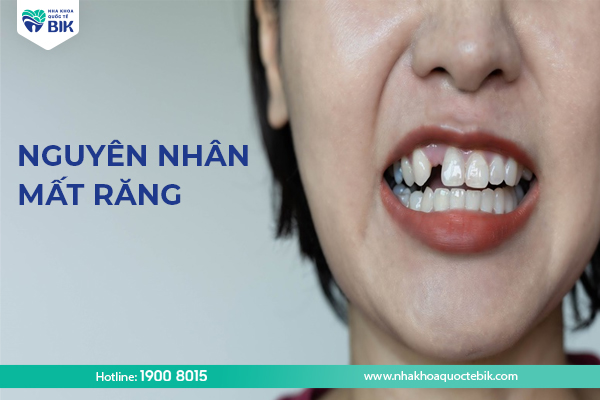
Consequences if tooth loss is not treated early
According to the latest data from the Central Institute of Dentistry, more than 90% of the Vietnamese population is facing diseases related to the mouth, in which tooth loss is considered the main cause that seriously affects the health of the patient. The main reason is that tooth loss directly affects chewing function, causing digestive problems, oral nerve problems and reduced dental health, leading to premature aging such as sunken cheeks, sagging facial skin and wrinkles, making the face age quickly. Although tooth loss can cause many dangerous consequences, many people do not pay attention or do not fully understand the unpredictable effects of tooth loss!
Affects eating and digestion
When teeth are lost, biting and grinding food becomes more difficult, leading to indigestion, susceptibility to digestive diseases and inability to absorb nutrients.
Gingivitis, pulpitis
Many cases of tooth loss, if not restored and treated, will cause gum and pulp infections, leading to pain, swelling, and recurring pain and swelling, and can cause bad breath.
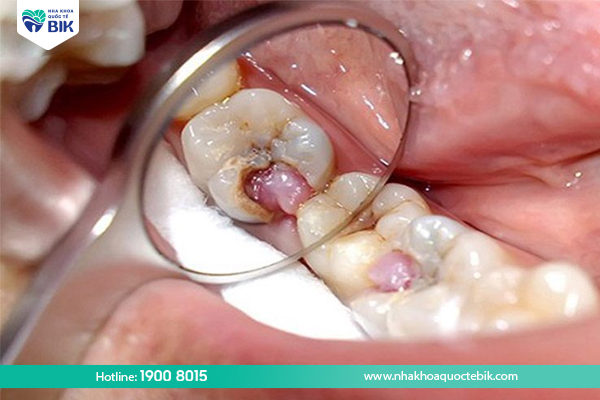
Long-term tooth loss will deform the face
Long-term tooth loss will change the shape of the face, making the face wrinkled, prematurely aged and with many wrinkles, … negatively affecting natural beauty.
Misalignment of teeth and the entire jaw
Tooth loss will create gaps between the remaining teeth, causing them to move and deviate from their original position over time.
Jawbone loss
As time passes, the longer the tooth loss and tooth root loss, the more serious the jawbone loss becomes.
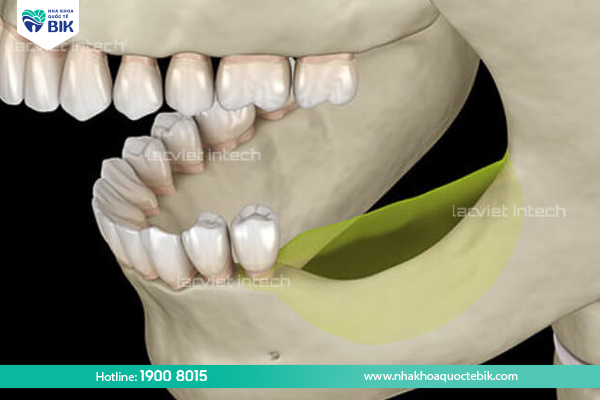
What to do when you lose teeth?
Many people are wondering how to fix the loss of many teeth, because when they are permanently lost, they cannot be regenerated. Currently, there are 3 most common ways to restore lost teeth as follows:
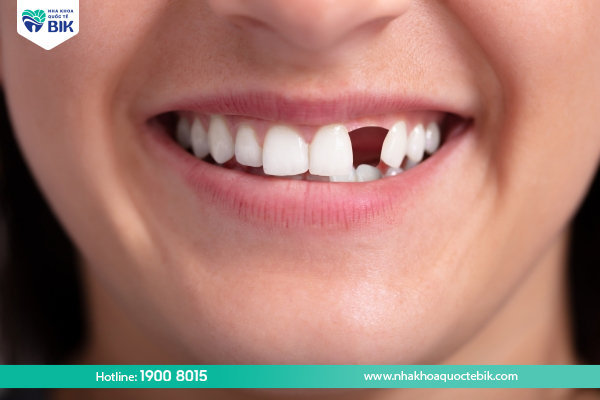
Removable dental implants
The use of dentures to replace lost teeth has existed for a long time and is still the most popular.
The main reason is because it is reasonably priced, restores lost teeth quickly and can be easily removed. Dentures usually include fake gums and fake teeth mounted on top, along with a hook to attach to real teeth to hold the jaw firmly.
Although it has existed for a long time, dentures still have many limitations. People who have lost permanent teeth and use dentures often feel unstable when eating and drinking, cannot prevent jaw bone degeneration and often cause gum pain.
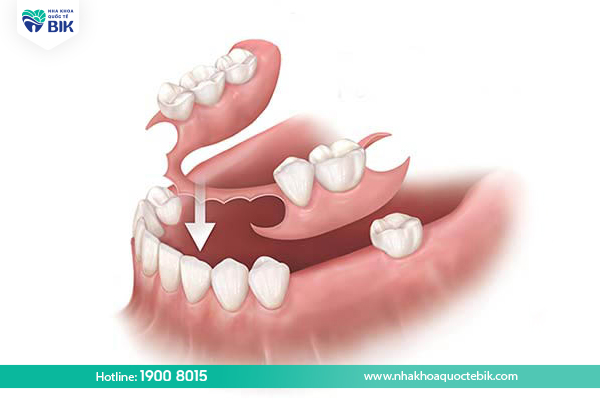
Making porcelain dental bridges
Porcelain dental bridges are a more modern and fixed method of dental implants than using removable dentures. Doctors will grind down both sides of the real teeth, then attach the porcelain dental bridge to the position of the lost teeth.
The advantage of porcelain dental bridges is that they do not need to be removed and have good chewing ability. However, over a long period of use, bone loss can occur, leading to the gums sinking and exposing the dentures. At the same time, grinding down real teeth can also cause a feeling of pain.
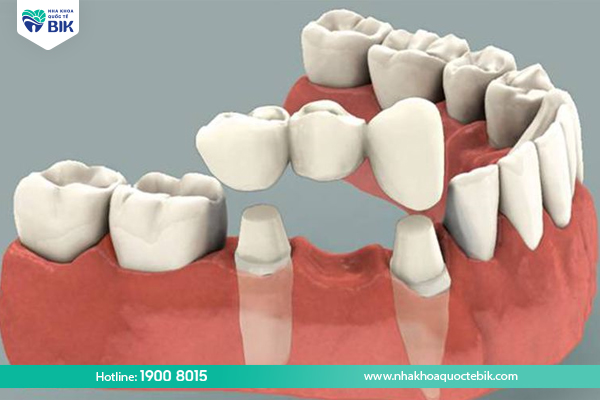
Fixed dental implants when losing teeth
What is an implant? Implantation (also known as dental implant) is the most modern and best method to restore lost teeth. With a structure consisting of a porcelain crown, an Abutment joint and an implant post that is firmly implanted into the jaw, it is completely like a real tooth. If you are wondering between having a removable or fixed denture, it is best to choose an implant.
Dental implants bring many benefits such as owning a real tooth and not having to deal with bone loss – something that removable dentures or porcelain teeth cannot overcome. At the same time, the time of using dental implants is also long-term, even permanent if properly cared for.
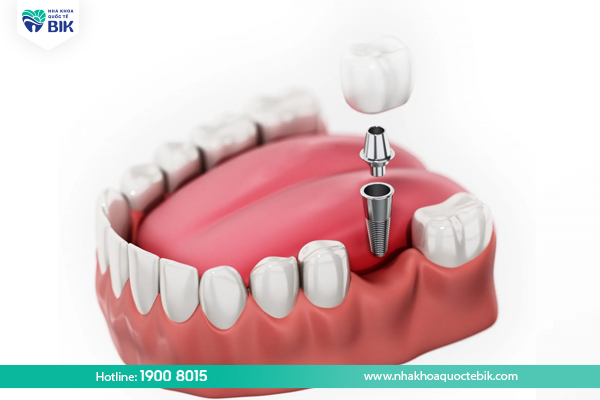
Currently, tooth loss and dentures have become a common problem to ensure normal chewing function and aesthetics. To know which type of denture is suitable for you, you should see a specialist for examination and consultation.
When can a permanent tooth be replanted?
According to the doctor’s advice, after losing a permanent tooth, it is necessary to replant it immediately to ensure the best results. The optimal time to do this is about 2 months after tooth extraction. If the tooth loss is prolonged, many undesirable consequences will occur.
Among the tooth replantation options mentioned, dental implants are the method that can be performed immediately after tooth extraction. This quick tooth replantation helps to minimize pain and helps the wound heal faster because it does not cause too much damage.
At the same time, there is no need to spend more on bone grafting because the jawbone has not yet deteriorated.

Is it good to have an implant after a permanent tooth loss?
For customers who have lost teeth, whether they have just lost them or have been lost for a long time, dental implants are the best solution. Dental implants act as real tooth roots and have long-term durability, allowing customers to live with peace of mind without any difficulty. In addition, dental implants also help completely overcome bone loss that causes facial deformities.
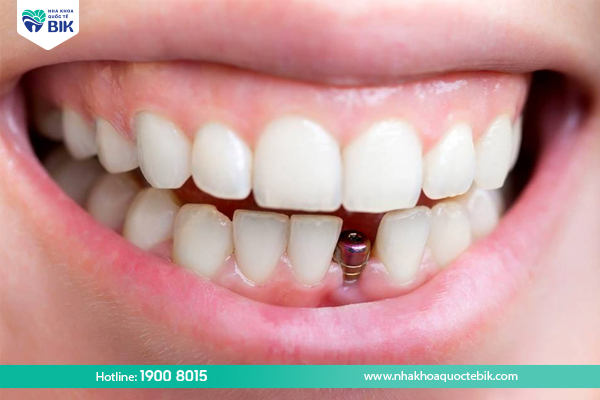
However, for people who have lost teeth for a long time, the jaw bone around the tooth root is often lost from 20% – 60% in the first 3 years, depending on the age and constitution of each person. Before implanting teeth, the dentist will have to perform bone grafting to facilitate implant placement.
This process is very complicated and requires a highly skilled and qualified doctor, especially experience and capacity to ensure success for the patient. Therefore, choosing a reputable dental address to perform the procedure is very important.
We hope this article from BIK International Dental Clinic will help you better understand the causes and consequences of tooth loss. Don’t let tooth loss affect your health and life. Contact us now for specific advice on your condition.


















